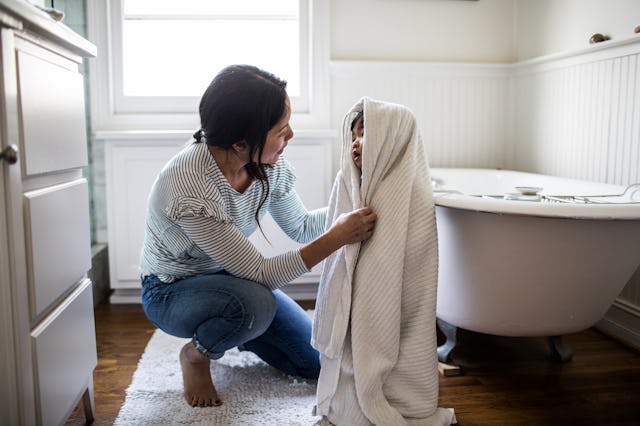Is It Safe To Shower During A Thunderstorm?
Raise your hand if your mom warned you about this growing up!

A funny thing happens when you become a parent: Things your parents told you as a child start to come out of your mouth, and only then do you begin to question some of the wisdom you took as gospel when you were growing up. Will you go cross-eyed if you sit too close to the TV? Unlikely. Does it take seven years to digest your gum if you swallow it? Sorry, Mom — but nope. Another classic example of one of these urban legends passed on by parents to their unwitting children? Getting your scrub on when it's storming is dangerous. And inquiring minds need to know: Is it safe to shower during a thunderstorm?
Well, let's look at the facts. The basis of the claim is that if a bolt of lightning hits a house or building, it can travel through plumbing, including metal pipes, which are great conductors of electricity. Additionally, water can carry electrical currents from lightning, meaning there's a risk of getting shocked or electrocuted during a storm if you happen to be in the tub or shower.
While the chances of being electrocuted this way are extremely rare, there is some truth to this old wives' tale. Here's what you need to know to stay safe during a thunderstorm — and why you might want to hop out of the shower and skip that bubble bath when one's a-brewing.
What happens during a thunderstorm?
Thunderstorms form when warm, moist, and unstable air rises into cold air. Lightning starts basically as an electrical charge within a cloud. When the negative charges (electrons) in the bottom of the cloud are attracted to the positive charges (protons) in the ground, then BAM! Lightning happens.
In terms of how thunder and lightning are connected, thunder is created when lightning passes through the air. The lightning's electricity heats the air quickly, which makes for the perfect storm (pun intended) for thunder to occur. As for why lightning heats the air so fast, a single stroke of lightning can heat the air around it to 30,000°C (54,000°F), which is five times hotter than the sun! No wonder it's a major cause of weather-related deaths.
So, is it safe to shower or bathe during a thunderstorm?
It's not just an urban legend! According to the CDC, it is, in fact, not safe to shower or bathe during a thunderstorm. Because lightning can travel through plumbing, the CDC recommends avoiding all water during a thunderstorm. This includes showering, bathing, washing dishes, or even washing your hands.
Why does lighting strike houses in the first place? Essentially, lightning is searching for a way to hit the ground, and it sometimes finds its way through your home plumbing.
While the CDC mentions the risk of lightning traveling through plumbing might be less with plastic pipes than with metal pipes, it still advises people to avoid all activities involving plumbing just in case.
What are the risks?
The silver lining here is that your chances of being struck by lightning are low. The average American has a 1 in 1.2 million chance of being struck by lightning. But, unfortunately, these odds increase to 1 in 15,300 over the course of your lifetime.
That said, a worst-case scenario situation could put you at risk of the following when showering during a thunderstorm:
- Cardiac arrest.
- Brain damage.
- Burns.
- Numbness and tingling.
- Death.
What should you do inside when you're caught in a thunderstorm?
If you and the kiddos are at inside your home when a fierce thunderstorm breaks out, you can put your minds at ease by taking a few simple precautions. According to the CDC, you should keep these safety tips in mind:
- Avoid electrical equipment or cords.
- Stay away from all activities involving plumbing; avoid showering, bathing, and washing your hands.
- Keep away from windows and doors, and stay off porches and balconies.
- Don't lie down on concrete floors or lean against concrete walls.
Once the storm clears, feel free to hop in a hot shower or run that bubble bath for the kids. And, hey, you may even want to call Mom or Dad and apologize for doubting them — turns out they were right (this time).
This article was originally published on